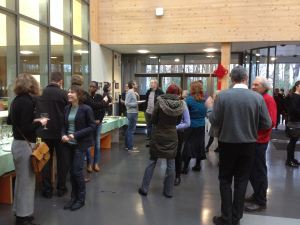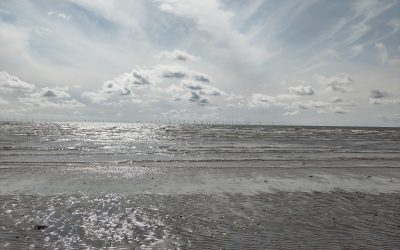On 2 December 2015 the Centre for Mobilities Research hosted a lunch and research sharing session, bringing together researchers from across the departments at Lancaster University and beyond.
Some in attendance were already members of CeMoRe. For others, it was a chance to learn about the Centre and to see how their work and interests resonate with mobilities research. In what follows, I give a brief summary of the 14 presentations that were given at the event. Each presenter had 3 minutes to talk about their research, with an emphasis on current projects. It was an excellent opportunity to see the diversity of research connected to mobilities, and the presentations spurred some great conversations during the lunch afterwards.
1. Martin Spring (Lancaster University Management School) outlined his research on how firms connect with other firms, emphasizing the spatial, contractual, and relational aspects of having many organizations collocated under one roof.
2. Linda O’Keeffe (Lancaster Institute for the Contemporary Arts) presented her recent project working with elderly people in Derry, using mobile audio technologies such as tablets to make field-recordings and encourage engagement with urban space through sound-making activities.
3. Rod Dillon (Faculty of Health and Medicine) gave a presentation on his research in Brazil investigating the interrelations between humans, insects, and parasites, using sandflies as an example to show how insect behavior determines disease transmission.
4. I (Samuel Thulin – CeMoRe and Sociology) presented my research on ‘situated composition’, a term that both delineates a set of practices associated with the increased mobility and accessibility of tools for working with sound, and describes a conceptual approach attending to how recording and sound production have always been situated and composed of multiple components, both material and social.
5. Erika Fülöp (Department of European Languages) shared her research on digital transformations in literature and the migration of the book to the web, outlining 4 perspectives on how writing on the internet is different from writing in and for books, involving 1) process; 2) content and form; 3) the reader; 4) interaction between the author and reader.
6. Derek Gatherer (Biomedical and Life Sciences) shared his work on biofutures, which have to do with anything that is an inescapable force from our biological features. He mentioned in particular his interest in infectious diseases and in how we share the planet with other species, outlining some utopian and dystopian biofutures.
7. Katy Mason (Lancaster University Management School) presented her research on innovation and the use of market-making devices, exploring issues such as the relationship between science and markets, and connections between expectations and markets in the case of the driverless car.
8. Miriam Meissner (Sociology and Media and Cultural Studies) presented her research on mobilities that pose a challenge in terms of imagination and representation, such as high frequency trading, highlighting the importance of finding ways of narrating mobilities in the city and drawing attention to the political implications these narratives.
9. Lisa Wood (Faculty of Health and Medecine) gave a presentation on her research into the organization of work practices, asking: what ties work practices together when people are mobile? What happens when workers go on the move? And what ties workers and practices to specific places?
10. Colin Pooley (Lancaster Environment Centre) shared his research on historical mobilities, covering a range of areas from the use of life-writing to understand patterns of everyday mobility in the past, to media representations of migrants to England between 1850-1910, to how current transport technology and policy can learn from the past.
11. Corina Sas (School of Computing and Communications) presented her research on digital futures, focusing on the ways in which wearables can facilitate more reflective societies, and how open source software and hardware can contribute to democratizing societies; these developments offer potential benefits for health and well-being.
12. Bijan Aryana (Lancaster Institute for the Contemporary Arts) shared his work in the areas of User Research and Cultural Usability, discussing design for health, with an emphasis on the possibilities of using mobile devices to improve mental health services for people from different backgrounds – inclusive mobile self-help.
13. Élise Atangana, independent curator and producer, presented her explorations of the politics of mobility and relationships between habit and space, themes she has been working with during her residency at Delfina Foundation. These themes are feeding into Seven Hills, her curatorial project for the 2016 Kampala Art Biennale.
14. Mike Berners-Lee (Small World Consulting; Lancaster Environment Centre) presented his research on carbon and mobilities, emphasizing the importance of quantifying and comparing the carbon impact of the ways people and objects move around in order to gain a better perspective on what kinds of things contribute most to a more sustainable, low-carbon world.




